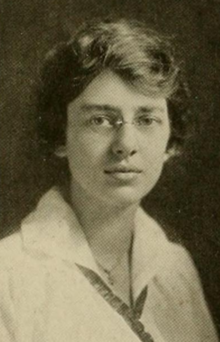Faith Moors Williams (1893–1958)[1] was an American economist who became Director of the Office of Foreign Labor Conditions in the Bureau of Labor Statistics.[2]

Williams graduated from Wellesley College in 1915,[3] and earned a Ph.D. in economics from Columbia University[4][5] in 1924. Her doctoral dissertation was The Food Manufacturing Industries in New York and its Environs: Present Trends and Probable Future Developments.[6] She then worked on rural nutrition as an assistant professor in the College of Home Economics at Cornell University,[4][7] and assisted with the economic components of the Middletown studies.[5]
Next, Williams became a senior economist in the Bureau of Home Economics. There, with Carle C. Zimmerman of Harvard University, she coordinated a massive survey of international home living conditions and expenses, published in 1935 as Studies of Family Living in the United States and Other Countries: An Analysis of Material and Method.[1] Later, at the Bureau of Labor Statistics, with Aryness Joy Wickens and Stella Stewart, Williams became one of the primary people in charge of the BLS cost-of-living index, later to become the United States Consumer Price Index.[8]
Williams' husband was demographer Frank Lorimer, who had studied at Columbia at approximately the same time as she did. They had two children.[9]
In 1946, Williams was elected as a Fellow of the American Statistical Association, two years after her husband attained the same honor.[10]
References edit
- ^ a b Vecchi, Giovanni (2017), Measuring Wellbeing: A History of Italian Living Standards, Oxford University Press, p. 518, ISBN 9780199944606
- ^ Goldberg, Joseph P.; Moye, William T. (1985), The first hundred years of the Bureau of Labor Statistics, Bulletin of the United States Bureau of Labor Statistics, vol. 2235, U.S. Department of Labor, p. 166, ISBN 9780935043013
- ^ "Degrees conferred in 1915", Calendar 1915–1916, Wellesley College Bulletin, Wellesley College, 1913, pp. 181–184
- ^ a b Pietrykowski, Bruce (2009), The Political Economy of Consumer Behavior: Contesting Consumption, Routledge Advances in Social Economics, Routledge, p. 45, ISBN 9781135978693
- ^ a b Stapleford, Thomas A. (2009), The Cost of Living in America: A Political History of Economic Statistics, 1880–2000, Cambridge University Press, p. 152
- ^ Madden, Kirsten Kara; Seiz, Janet A.; Pujol, Michèle A. (2004), A Bibliography of Female Economic Thought to 1940, Routledge studies in the history of economics, vol. 64, Routledge, p. 504, ISBN 9780415238175
- ^ Stage, Sarah; Vincenti, Virginia Bramble (1997), Rethinking Home Economics: Women and the History of a Profession, Cornell University Press, p. 153, ISBN 9780801481758
- ^ Stapleford (2009), pp. 153 and 228.
- ^ Cook, Joan (June 28, 1985), "Frank Lorimer, Demographer", The New York Times
- ^ ASA Fellows list, American Statistical Association, archived from the original on 2017-12-01, retrieved 2017-11-03